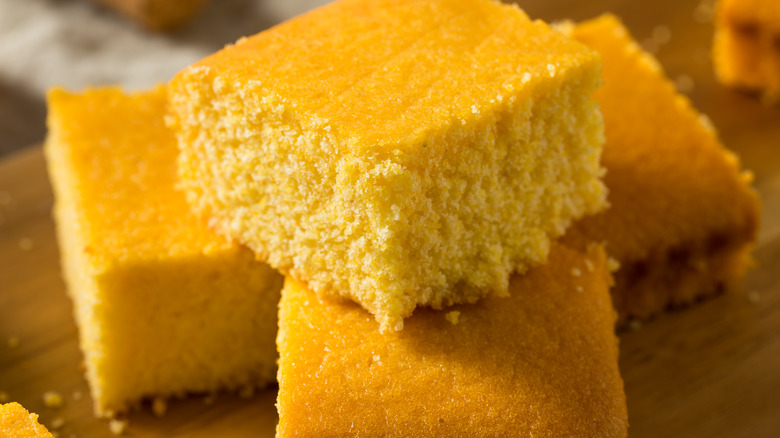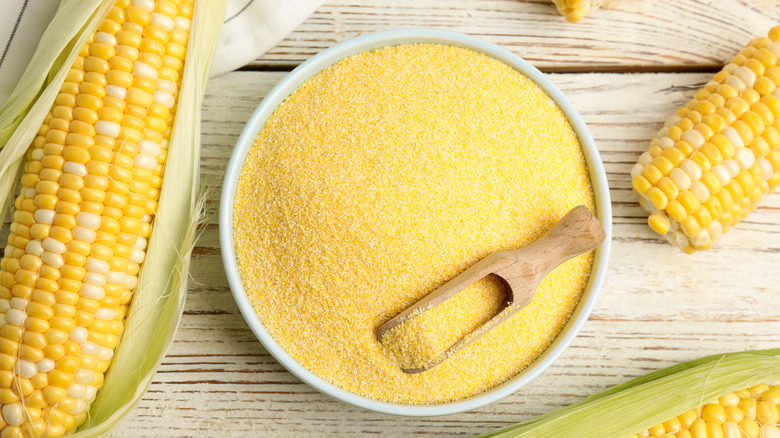Is Cornbread Bad For You?
Cornbread has been around for millennia, providing a convenient source of nutrients for native populations in North America (via Delishably). The original recipe, an antecedent of today's modern Southern cuisine, called for water, cornmeal, and a pinch of salt mixed together and then cooked in a cast-iron skillet in the oven. Later, people started to use new ingredients, from eggs and baking soda to buttermilk. However, most cornbread recipes developed before the 20th century contained no sugar or wheat flour, notes Serious Eats. Nowadays, you can find cornbread made with butter, white flour, onions, molasses, sweet peppers, and everything in between. Some versions are more similar to cake or muffins than bread.
This Southern specialty is more or less healthy, depending on the ingredients used. For example, a piece of cornbread (2.2 ounces) made with low-fat milk has around 170 calories, 4.4 grams of protein, 4.6 grams of fat, and 28 grams of carbs (via MyFoodData). It's also a good source of calcium, phosphorus, zinc, magnesium, iron, and vitamin B12. As you would expect, sugar and other extras can increase its energy value and carb content.
Both cornmeal and corn flour are gluten-free, making them suitable for those with Celiac disease or gluten intolerance. But even so, you should still check the label to make sure the bread has not been cross-contaminated with wheat, rye, or other grains containing gluten, recommends Beyond Celiac. With that being said, let's take a closer look at the potential benefits and drawbacks of cornbread.
Cornbread is more nutritious than white bread
Calorie per calorie, cornbread offers more nutrients than white bread. For starters, cornmeal — its main ingredient — provides about 9 grams of fiber per cup, according to MyFoodData. You'll also get a hefty dose of protein, iron, magnesium, and B-complex vitamins. One cup of white flour, by comparison, has only 3.4 grams of fiber and lower amounts of potassium, magnesium, carotenoids, and other nutrients, per MyFoodData. Cornbread may also contain milk, butter, eggs, and other ingredients rich in protein. Again, its nutritional value depends on the recipe.
For example, the American Heart Association shared a Southern cornbread recipe that calls for yellow cornmeal, all-purpose flour, whole kernel corn, fat-free milk, eggs, sugar, and other basic ingredients. One serving has 140 calories, 4 grams of protein, and 2 grams of fiber. However, you can ditch the sugar and white flour to cut calories. Or you can add more eggs and other ingredients, such as flaxseeds or nutritional yeast, to get more fiber and protein.
Most types of cornbread contain milk, eggs, and other sources of complete protein, explains Verywell Fit. Therefore, you'll get all of the essential amino acids, including leucine, isoleucine, valine, and others. These nutrients support hormone production, nerve function, skin health, and metabolism. Iron, one of the most abundant minerals in cornbread, plays a key role in red blood cell production. Phosphorus, selenium, and other nutrients fight inflammation and oxidative stress while keeping your bones strong, notes Healthline.
Eating too much cornbread can take a toll on your health
This Southern specialty packs a hefty nutritional punch, but you still need to watch your portions. Both cornmeal and corn, two of the main ingredients, are high in carbs and can raise your blood glucose levels, warns Diabetes Strong. The addition of sugar, white flour, and other simple carbs only makes things worse. Milk, eggs, butter, and other animal foods, on the other hand, contain saturated fat, notes the American Heart Association. When consumed in excess, saturated fat can increase bad cholesterol levels and contribute to heart disease.
Cornbread is also relatively high in calories and may lead to weight gain. Your best bet is to use a basic recipe and cut out the extras, such as sugar and buttermilk. Another option is to seek healthier alternatives to sugar, cornmeal, and other high-carb ingredients.
For example, you can swap sugar for stevia and replace cornmeal with almond flour, suggests Diabetes Strong. Corn kernels can be a healthy substitute for butter, while nutritional yeast can replace eggs and cheese in most recipes. Better yet, use whole-grain cornmeal instead of refined (yellow) cornmeal to boost your fiber intake. Remember that you can always add a pinch of cinnamon, vanilla, nutmeg, or other spices for extra flavor.



